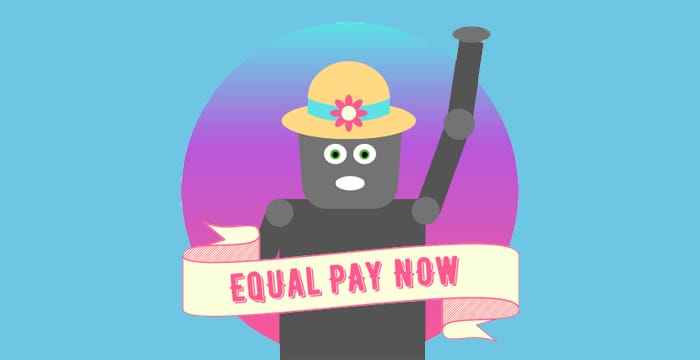Awkward

A Twitter bot is targeting big firms on International Women’s Day with details of their gender pay gap.
The account @PayGapApp is retweeting law firm and other employers’ tweets commemorating the global day with an auto response detailing their median hourly pay gap using data from a UK government website.
“Stop posting platitudes,” the account’s banner reads. “Start fixing the problem.”
This year’s IWD theme is ‘#BreakTheBias’ and so a lot of the firms’ tweets describe how they’re committed to breaking gender inequality and calling out bias.
It’s all very awkward, and here are some of the law firms targeted so far:
Bevan Brittan
In this organisation, women's median hourly pay is 26.2% lower than men's. https://t.co/LAVerXGz1V
— Gender Pay Gap Bot (@PayGapApp) March 8, 2022
Birketts
In this organisation, women's median hourly pay is 20.2% lower than men's. https://t.co/i1CWg8mbs8
— Gender Pay Gap Bot (@PayGapApp) March 8, 2022
Blake Morgan
In this organisation, women's median hourly pay is 40.8% lower than men's. https://t.co/8Y8nit9WTJ
— Gender Pay Gap Bot (@PayGapApp) March 7, 2022
Browne Jacobson
In this organisation, women's median hourly pay is 24% lower than men's. https://t.co/VrwUZw80wy
— Gender Pay Gap Bot (@PayGapApp) March 8, 2022
Digby Brown
In this organisation, women's median hourly pay is 18.2% lower than men's. https://t.co/q8AW3Lk0IK
— Gender Pay Gap Bot (@PayGapApp) March 8, 2022
DLA Piper
In this organisation, women's median hourly pay is 16.8% lower than men's. https://t.co/59aCUjreVm
— Gender Pay Gap Bot (@PayGapApp) March 8, 2022
DWF
In this organisation, women's median hourly pay is 24% lower than men's. https://t.co/6BnfHbysKu
— Gender Pay Gap Bot (@PayGapApp) March 8, 2022
Forsters
In this organisation, women's median hourly pay is 26.9% lower than men's. https://t.co/6unhcCfC9b
— Gender Pay Gap Bot (@PayGapApp) March 8, 2022
Mishcon de Reya
In this organisation, women's median hourly pay is 27.8% lower than men's. https://t.co/yeERvmPNcB
— Gender Pay Gap Bot (@PayGapApp) March 8, 2022
The Law Society
In this organisation, women's median hourly pay is 11.3% lower than men's. https://t.co/Y1HJIKac0Y
— Gender Pay Gap Bot (@PayGapApp) March 7, 2022
Simmons & Simmons
In this organisation, women's median hourly pay is 31.6% lower than men's. https://t.co/iqqBjDpZKq
— Gender Pay Gap Bot (@PayGapApp) March 8, 2022
In this organisation, women's median hourly pay is 31.6% lower than men's. https://t.co/iqqBjDpZKq
— Gender Pay Gap Bot (@PayGapApp) March 8, 2022
Shearman & Sterling
In this organisation, women's median hourly pay is 52% lower than men's. https://t.co/Bg3BhY1vp5
— Gender Pay Gap Bot (@PayGapApp) March 8, 2022
In this organisation, women's median hourly pay is 52% lower than men's. https://t.co/Bg3BhY1vp5
— Gender Pay Gap Bot (@PayGapApp) March 8, 2022
TLT
In this organisation, women's median hourly pay is 31.9% lower than men's. https://t.co/aTFAChxmrP
— Gender Pay Gap Bot (@PayGapApp) March 8, 2022
In this organisation, women's median hourly pay is 31.9% lower than men's. https://t.co/aTFAChxmrP
— Gender Pay Gap Bot (@PayGapApp) March 8, 2022
Watson Farley & Williams
In this organisation, women's median hourly pay is 17% lower than men's. https://t.co/QkfyFSjove
— Gender Pay Gap Bot (@PayGapApp) March 8, 2022
Weightmans
In this organisation, women's median hourly pay is 22.6% lower than men's. https://t.co/JRdpYQBMBq
— Gender Pay Gap Bot (@PayGapApp) March 8, 2022
In this organisation, women's median hourly pay is 22.6% lower than men's. https://t.co/JRdpYQBMBq
— Gender Pay Gap Bot (@PayGapApp) March 8, 2022
White & Case
In this organisation, women's median hourly pay is 26.4% lower than men's. https://t.co/ntJTt0y4nL
— Gender Pay Gap Bot (@PayGapApp) March 8, 2022
Winckworth Sherwood
In this organisation, women's median hourly pay is 17.1% lower than men's. https://t.co/BnWtst1nUV
— Gender Pay Gap Bot (@PayGapApp) March 8, 2022
Womble Bond Dickinson
In this organisation, women's median hourly pay is 31.6% lower than men's. https://t.co/HjpbyEDw3A
— Gender Pay Gap Bot (@PayGapApp) March 8, 2022
The celebratory tweets posted by some firms like Harper Macleod, Thorntons Law and Ward Hadaway appear to be no longer visible.
All employers with 250 or more employees are required by law to publish their gender pay gap figures each year. These can all be searched for and compared using the government’s official ‘gender pay gap service’ which is understood to be the bot’s point of reference.
For the latest news, commercial awareness insight, careers advice and events:
Sign up to the Legal Cheek Newsletter

